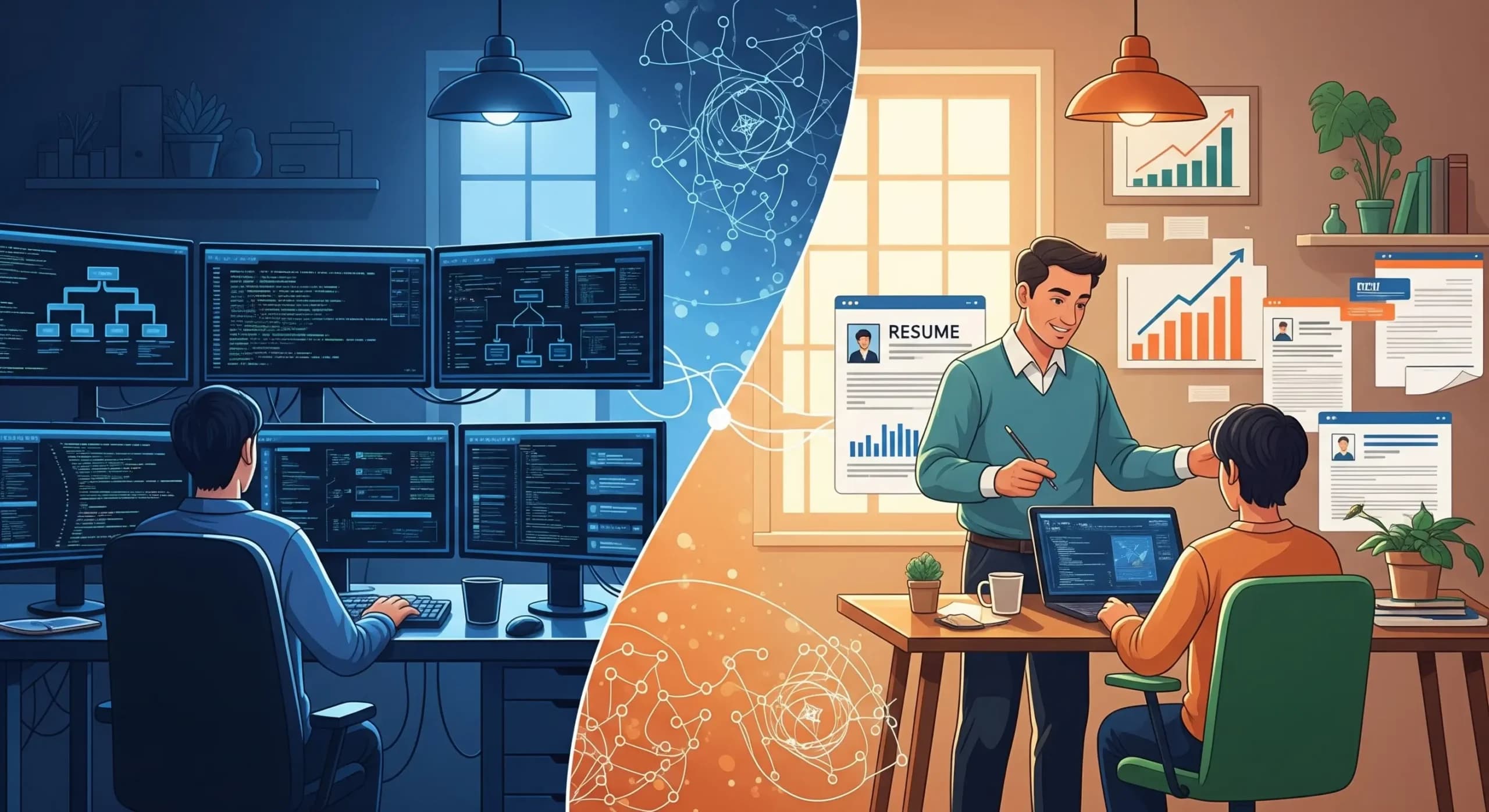
I’m still a developer. I’ve been writing code for 17 years, led 40+ teams, worked as a CTO, shipped thousands of features. But these days I spend most of my time helping people fix their resumes, land better jobs and upgrade their overall professional persona and mindset.
Yeah, I know how that sounds.
Here’s what happened
I had a solid gig in 2021. $80k+, good team, interesting problems to solve. Then life happened. Had to step away for personal stuff. When I came back a year later, everything had changed.
AI was everywhere. The frameworks I knew were old news. And I’m 43, which means I’m too senior for most “developer” roles but not corporate enough for VP titles. Fun spot to be in.
So I did what any reasonable person would do. Started applying everywhere. 20 applications a day, same resume, same silence.
The problem wasn’t my code
I could still debug Kubernetes clusters and architect systems that didn’t fall over. But none of that mattered if I couldn’t get past the first filter.
Then I started messing around with AI. Not for coding, just random stuff. And I had this idea, what if I fed it job descriptions and asked it to rewrite my resume to match their keywords?
It worked. Like, really worked.
Within two weeks I had three interviews lined up. Same experience, just translated into language that hiring managers actually understood. It still does, as I am getting invites from companies to apply.
The feeling and mindset…
I helped a few friends do the same thing. All of them saw results immediately. One guy went from zero responses to three offers in a month.
And that felt better than any successful deployment I’d ever done.
Here’s the weird part. I realized I’d always been doing this anyway. My motto has been “sharing best practices” since day one. Whether I was documenting processes at Dell, mentoring junior devs, or writing those WordPress plugin guides that somehow got 4.9 stars.
The satisfaction of watching someone finally get a concept they’d been struggling with? That always beat fixing even the trickiest production bug.
So I built AixonAI
Not because I wanted to leave tech. Because I found a tech problem that actually mattered to real people.
At 43, after working with thousands of professionals worldwide and making plenty of mistakes myself, I figured the next few years should be about helping others avoid the same headaches I went through.
The joy of helping someone land their dream job beats completing the most perfectly architected, zero-downtime system. Maybe that sounds soft coming from someone who’s obsessed over 99.9% uptime, but it’s true.
I’m not quitting code
Don’t get me wrong. I still love solving problems and building things. For the last two years I’ve been deep into AI and automation, and I’ll keep learning that stuff. I’m still doing AI and automation consulting alongside the coaching work.
I write code for AixonAI every day and create automation workflows for my current clients. I still think in systems and scalability. The difference is now the end users are people trying to pay rent, not companies trying to increase engagement metrics.
What I learned
This isn’t really a career change. It’s applying the same skills to different problems.
Debugging why someone’s resume isn’t getting responses is a lot like debugging why a service is throwing 500s. Managing cross-functional teams prepared me for explaining technical value to non-technical people. Building systems that work for thousands of users taught me how to create processes that help hundreds of job seekers at once.
The results are different though
With in a few weeks of its launch, AixonAI has helped over 2500+ people rewrite their resumes in 30 seconds or less. The feedback is immediate and specific. It is working for people the way I wanted.
In my old roles, success meant features shipped on time and systems staying online. Important work, but abstract. Now success is real people getting real opportunities. It’s harder to measure but way easier to feel.
Where this goes
AixonAI stays free. That’s not a business strategy, it’s the point. Good people shouldn’t have to pay to be seen by hiring algorithms.
I’m working on interview prep, salary negotiations, career transitions. Same principle: take things that are hard for humans and make them simple.
Will I go back to pure development? Maybe. Probably as a CTO or technical co-founder, building teams that solve problems this big.
But once you taste building something that changes people’s lives, it’s hard to go back to just building something that works.
That’s the real difference. The code I write now has to help someone grow, not just make me feel clever. Turns out that’s a pretty good filter for everything else too.